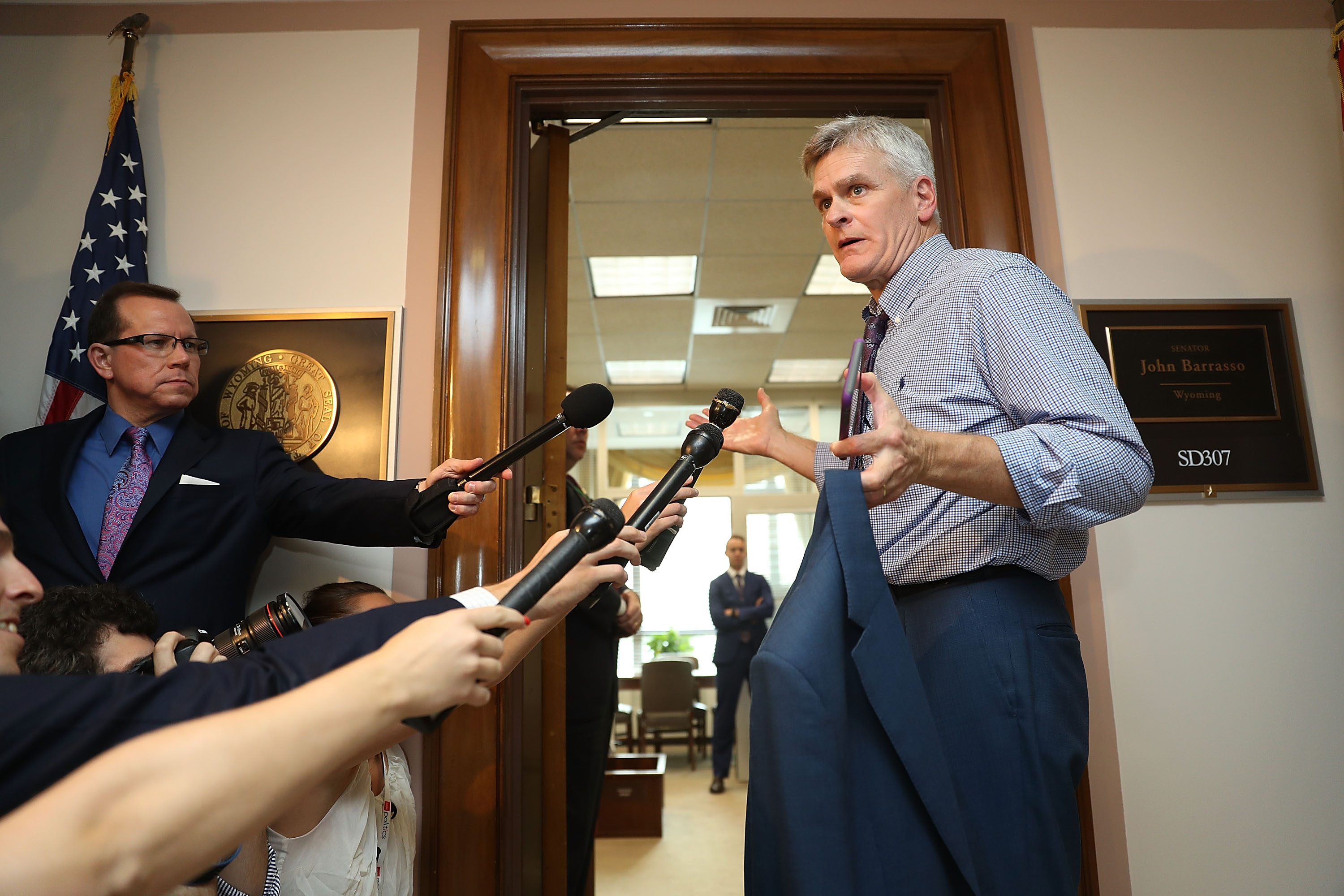Why can't the GOP make a case for its own health-care bill?
Let's examine Republicans' flimsy explanations for their last-ditch health-care push


The health-care bill Senate Republicans hope to pass next week, named after sponsoring Sens. Lindsey Graham (R-S.C.) and Bill Cassidy (R-La.), has plenty of potential winners and losers, like all legislation. According to The Associated Press, the winners would include medical device manufacturers, people who oppose the individual mandate to purchase health insurance, and those with tax-sheltered health savings accounts, while the losers would include people with pre-existing conditions, pregnant women, the elderly, and people in the 31 states that opted to expand Medicaid.
You probably prefer one of those groups over another. But regardless of where your sympathies lie, there's surely a genuine debate to be had about Graham-Cassidy. Most Republican lawmakers, however, seem unwilling to engage in it.
"I am just in shock how no one actually cares about the policy anymore," a GOP lobbyist told Caitlin Owens at Axios, referring to the GOP's rushed, last-minute health-care legislating. Conservative policy analyst Douglas Holtz-Eakin called it "the Lazarus of health-care bills," adding: "It's back, and I don't know exactly why that is. ... If it was just a policy argument, I don't think it would have come back."
The Week
Escape your echo chamber. Get the facts behind the news, plus analysis from multiple perspectives.

Sign up for The Week's Free Newsletters
From our morning news briefing to a weekly Good News Newsletter, get the best of The Week delivered directly to your inbox.
From our morning news briefing to a weekly Good News Newsletter, get the best of The Week delivered directly to your inbox.
If the policy appears oddly slapdash, the politics are downright bizarre. Graham-Cassidy was introduced only last week, to very low expectations, then grabbed hold of the GOP imagination late last week, so there is no polling yet on this particular bill. But it is more radical than many of the GOP's ObamaCare repeal-and-replace predecessors from this year, and those polled poorly to abysmally. A May poll from the Kaiser Family Foundation asked about block-granting Medicaid to states, the main feature of Graham-Cassidy, and that got support from only 26 percent of Americans, and just 48 percent of Republicans.
So what's going on? It's pretty clear that President Trump mostly wants to sign a bill that he can say repeals and replaces ObamaCare, and he doesn't care about the particulars. "I thought that when I won I would go to the Oval Office, sit down at my desk, and there would be a health-care bill," he told Fox News on Wednesday. But at this point, nobody really expects Trump to understand health-care policy. This, for example, is not true:
But lawmakers in Congress are expected to understand the substance of the bills they pass. In this case, it seems they — like Trump — just want to pass something, anything. When Cassidy was excoriated about the specifics of his namesake bill by Jimmy Kimmel, he said it was the late-night comedian who didn't understand the policy (policy experts said Kimmel appeared better informed than Cassidy) and that "we have a Sept. 30 deadline on our promise" to repeal and replace ObamaCare. (Though as Josh Barro points out, that deadline is self-imposed, and if Republicans wanted, they could spend all next year working on a health-care bill they could pass with only 50 Republican votes.)
So, what are Republicans saying about their legislation to significantly alter health-care in the country, with no Congressional Budget Office analysis on how it would affect people and their pocketbooks and over the objection of the American Medical Association and other medical and patient advocacy groups, state Medicaid directors, the insurance trade group AHIP, Blue Cross Blue Shield, every Democrat, and a handful of Republican governors, including Trump's ally Gov. Chris Christie (R-N.J.)?
A free daily email with the biggest news stories of the day – and the best features from TheWeek.com
Mostly, they say that ObamaCare is broken and instead of fixing it, it's better to let states decide how to administer health insurance — an argument Paul Waldman took down here at The Week and Jonathan Chait found holes in at New York. Other than that, as Jeff Spross says at The Week, it was all "word salad referencing new 'efficiencies' states would find, which would supposedly allow them to deliver the same coverage for less money."
Spross was referring specifically to interviews Vox's Jeff Stein had with nine Republicans. It's worth reading Stein's whole article.
"If we do nothing, it has a tremendous impact on the 2018 elections," Sen. Pat Roberts (R-Kan.) told Stein. "And whether or not Republicans still maintain control and we have the gavel." Then he brought up a famous 1991 movie that ended in two women committing suicide. "Look, we're in the back seat of a convertible being driven by Thelma and Louise, and we're headed toward the canyon. .... So we have to get out of the car, and you have to have a car to get into, and this is the only car there is." Graham-Cassidy "is not the best possible bill — this is the best bill possible under the circumstances," he added.
"My position has always been that, No. 1, I think ObamaCare has been a failure," Sen. John Kennedy (R-La.) told Stein. "No. 2: First chance I get to vote for repeal it, I'll do it. And No. 3: If it's replacement, if replacement is better than ObamaCare, I will vote for it. ... Read the bill and you'll understand."
Sen. Chuck Grassley (R-Iowa) told The Des Moines Register that the substance, giving states "the opportunity to deliver health care more efficiently and effectively," wasn't everything. "You know, I could maybe give you 10 reasons why this bill shouldn't be considered," he said. "But Republicans campaigned on this so often that you have a responsibility to carry out what you said in the campaign. That's pretty much as much of a reason as the substance of the bill."
Grassley acknowledged that Graham-Cassidy wouldn't lower premiums or expand choices until 2020, if at all, but said those issues would be taken care of in a "stopgap" measure being considered, adding, "What you want to do long-term is going to be done in the Alexander bill." (Sen. Lamar Alexander (R-Tenn.) killed his bipartisan effort Tuesday night, presumably to help pass Graham-Cassidy.)
So, Republicans don't like ObamaCare, they don't want to fix it because they have been promising to kill it, they believe it is better to let states create their own systems with less money — even if tens of millions of fewer people have health care, as independent analyses suggest — they're eager to end Medicaid as it exists now, and they don't care that none of this is popular. Maybe enough Republicans are sure, or sure enough, that Graham-Cassidy is a gamble worth taking, because they believe that the federal government should spend less and extricate itself from the health insurance business. That's a policy debate that is certainly worth having, in a public forum like the U.S. Senate, for more than 90 seconds.
Peter has worked as a news and culture writer and editor at The Week since the site's launch in 2008. He covers politics, world affairs, religion and cultural currents. His journalism career began as a copy editor at a financial newswire and has included editorial positions at The New York Times Magazine, Facts on File, and Oregon State University.
-
 Will there be peace before Christmas in Ukraine?
Will there be peace before Christmas in Ukraine?Today's Big Question Discussions over the weekend could see a unified set of proposals from EU, UK and US to present to Moscow
-
 Quiz of The Week: 6 – 12 December
Quiz of The Week: 6 – 12 DecemberQuiz Have you been paying attention to The Week’s news?
-
 The week’s best photos
The week’s best photosIn Pictures A man's best friend, the elephants in the room, and more
-
 Has Zohran Mamdani shown the Democrats how to win again?
Has Zohran Mamdani shown the Democrats how to win again?Today’s Big Question New York City mayoral election touted as victory for left-wing populists but moderate centrist wins elsewhere present more complex path for Democratic Party
-
 Millions turn out for anti-Trump ‘No Kings’ rallies
Millions turn out for anti-Trump ‘No Kings’ ralliesSpeed Read An estimated 7 million people participated, 2 million more than at the first ‘No Kings’ protest in June
-
 Ghislaine Maxwell: angling for a Trump pardon
Ghislaine Maxwell: angling for a Trump pardonTalking Point Convicted sex trafficker's testimony could shed new light on president's links to Jeffrey Epstein
-
 The last words and final moments of 40 presidents
The last words and final moments of 40 presidentsThe Explainer Some are eloquent quotes worthy of the holders of the highest office in the nation, and others... aren't
-
 The JFK files: the truth at last?
The JFK files: the truth at last?In The Spotlight More than 64,000 previously classified documents relating the 1963 assassination of John F. Kennedy have been released by the Trump administration
-
 'Seriously, not literally': how should the world take Donald Trump?
'Seriously, not literally': how should the world take Donald Trump?Today's big question White House rhetoric and reality look likely to become increasingly blurred
-
 Will Trump's 'madman' strategy pay off?
Will Trump's 'madman' strategy pay off?Today's Big Question Incoming US president likes to seem unpredictable but, this time round, world leaders could be wise to his playbook
-
 Democrats vs. Republicans: who are US billionaires backing?
Democrats vs. Republicans: who are US billionaires backing?The Explainer Younger tech titans join 'boys' club throwing money and support' behind President Trump, while older plutocrats quietly rebuke new administration
